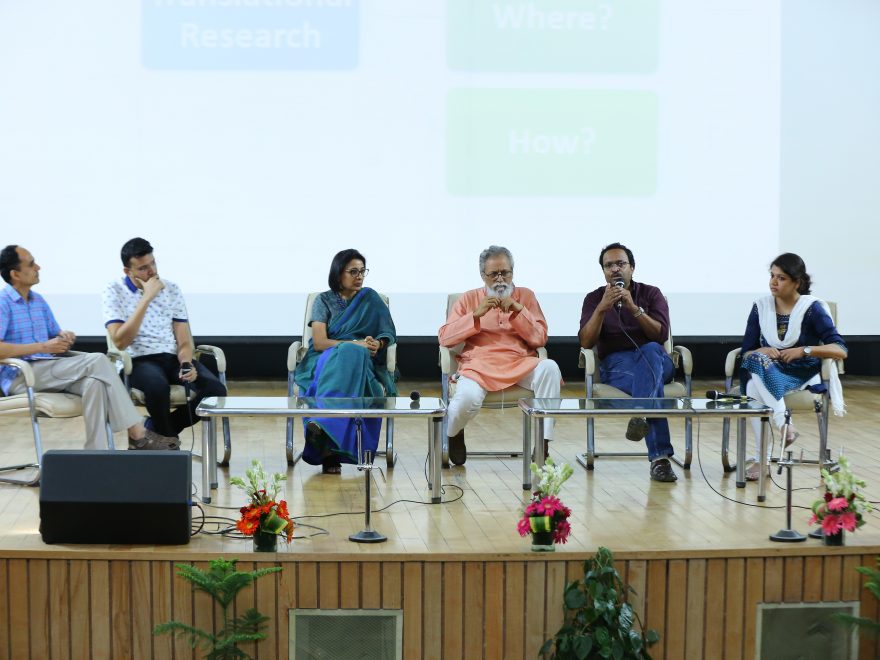A panel discussion was convened to mark the 9th Foundation day of THSTI on 14th July, 2018. The panelists were:
Prof. Anil Gupta – Visiting Faculty IIM – Ahmedabad and Founder, Honey Bee Network (Chairperson)
Dr. Krishnamohan Atmakuri – Assistant Professor, THSTI
Dr. Nitya Wadhwa – Assistant Professor, THSTI
Ms. Saimah Raza – Doctoral student, THSTI
Dr. Ajitesh Lunge – Doctoral student, THSTI
Moderated by Dr. Guruprasad Medigeshi – Associate Professor, THSTI

A brief summary of the discussion has been prepared using inputs from all the panelists and presented here.
Translational research – Who, where and how?
The objective of the panel meeting was to initiate a discussion on the definition of translational research in the context of Indian social and economic backgrounds and to identify the gaps and challenges in creating a translational ecosystem. The contents of the discussion has been summarized in the following paragraphs.
Defining Translational Research:
In layman terms, translation can simply mean a change of form, shape, practice etc. that may provide a temporary or a long-lasting solution to an existing problem/issue. Thus, based on the individual background or the context under consideration, the meaning of translation could vary. The process of translation begins with identifying a problem/an unmet need, then performing some sort of systematic evaluation to develop possible solutions and finally evaluate those solutions in the field. While such a process is more crudely performed by a common man, the scientific community performs the same with more rigor, disciplined systematic approach, validated process and evaluation. Thus, in a stricter sense, translational research is not confined to a laboratory, but pervades beyond Universities, Institutions, Companies etc. into the realm of a common man, his home or surroundings. Therefore, the panel felt that translation research can have several models/routes and dimensions when building solutions across different spheres of social life including agriculture, health, energy, climate, environment, urban development, etc.
Who is a translational researcher?
Anyone who identifies a unmet need/problem and strives towards a solution is a translational researcher. Systematic analyses is an essential attribute that the translational researcher must have. While compassion and empathy can drive an individual towards creativity and feasible solutions, so can commercial interests. Either way, one needs to be exposed to the problem before going down the innovation and translation path. A successful translational research path also requires constant and consorted inputs from end users for improved discovery/innovation and development of a feasible solution.
Where does translational research happen?
Often times, in India, incremental innovations and inventions by “untrained” people coined as “jugaad” or “localized” happen in places/locations not officially identified as ‘the’ sites for translation research. Despite the solution outreach, affordability and feasibility, some of these innovations go unnoticed as legitimate discoveries. While systematic approach to translation is often commended, it comes with a price, time and tag. Thus translation research can occur anywhere, best sometimes happening right where it is required and from the people who need it the most. While processes are being designed to encourage and protect the innovations of all kinds of translational researchers, a defined system/institution(s) that tests and regulates these inventions is essential.
India is considered as a graveyard of prototypes, with several unfinished projects due to several reasons. Therefore, we need to build an ecosystem of translation research in every research institute which should necessarily incorporate both basic and translational research components. Many health centers and major hospitals in India treat several hundreds to thousands of patients every day collecting large amounts of data. However, this information lays underutilized either because the data is not captured in a scientific and methodical manner or there is lack of interest or resources to process these into meaningful inferences and questions. If this is rapidly turned around, such information would be invaluable resource for all kinds of translational outcomes. Hence, it is highly essential to break the boundaries unofficially set forth to perform translational research beyond the confines of laboratories and hypothesis-driven programs.
How do we initiate translational research program?
It is important for end users to become active collaborators and cultural partners in all translational research programs. Research priorities can be well-designed and identified only when all the major and minor stakeholders equally participate and contribute to solve an identified problem. Several factors including recurrent factors control, influence and change the dynamics of problems that need quick/immediate interventions. Programs for young doctoral students, such as summer camps/schools in communities and health centers, will allow them to better understand the concept of inclusive innovation and emerge as innovators. Establishing industry-academia partnerships, support system for micro and small industries which invest in innovation and active engagement perhaps further nurture translational research as a bottom-up approach.


You really make it seem so easy with your presentation but I find this topic to be actually
something which I think I would never understand. It seems too
complicated and extremely broad for me. I’m looking
forward for your next post, I will try to get the hang of it! http://www.mbet88vn.com
Hi there! Such a great article, thanks!